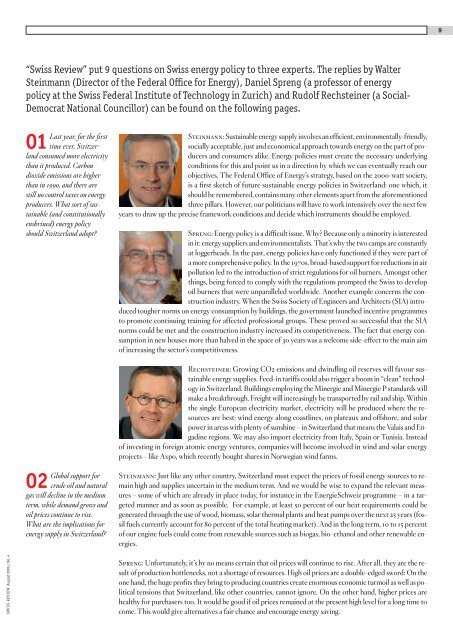Which energy will be best for Switzerland? Doris ... - Schweizer Revue
Which energy will be best for Switzerland? Doris ... - Schweizer Revue
Which energy will be best for Switzerland? Doris ... - Schweizer Revue
You also want an ePaper? Increase the reach of your titles
YUMPU automatically turns print PDFs into web optimized ePapers that Google loves.
9<br />
“Swiss Review” put 9 questions on Swiss <strong>energy</strong> policy to three experts. The replies by Walter<br />
Steinmann (Director of the Federal Office <strong>for</strong> Energy), Daniel Spreng (a professor of <strong>energy</strong><br />
policy at the Swiss Federal Institute of Technology in Zurich) and Rudolf Rechsteiner (a Social-<br />
Democrat National Councillor) can <strong>be</strong> found on the following pages.<br />
01<br />
Last year, <strong>for</strong> the first<br />
time ever, <strong>Switzerland</strong><br />
consumed more electricity<br />
than it produced. Carbon<br />
dioxide emissions are higher<br />
than in 1990, and there are<br />
still no control taxes on <strong>energy</strong><br />
producers. What sort of sustainable<br />
(and constitutionally<br />
enshrined) <strong>energy</strong> policy<br />
should <strong>Switzerland</strong> adopt?<br />
02<br />
Global support <strong>for</strong><br />
crude oil and natural<br />
gas <strong>will</strong> decline in the medium<br />
term, while demand grows and<br />
oil prices continue to rise.<br />
What are the implications <strong>for</strong><br />
<strong>energy</strong> supply in <strong>Switzerland</strong>?<br />
Steinmann: Sustainable <strong>energy</strong> supply involves an efficient, environmentally-friendly,<br />
socially acceptable, just and economical approach towards <strong>energy</strong> on the part of producers<br />
and consumers alike. Energy policies must create the necessary underlying<br />
conditions <strong>for</strong> this and point us in a direction by which we can eventually reach our<br />
objectives. The Federal Office of Energy’s strategy, based on the 2000-watt society,<br />
is a first sketch of future sustainable <strong>energy</strong> policies in <strong>Switzerland</strong>: one which, it<br />
should <strong>be</strong> remem<strong>be</strong>red, contains many other elements apart from the a<strong>for</strong>ementioned<br />
three pillars. However, our politicians <strong>will</strong> have to work intensively over the next few<br />
years to draw up the precise framework conditions and decide which instruments should <strong>be</strong> employed.<br />
Spreng: Energy policy is a difficult issue. Why? Because only a minority is interested<br />
in it: <strong>energy</strong> suppliers and environmentalists. That’s why the two camps are constantly<br />
at loggerheads. In the past, <strong>energy</strong> policies have only functioned if they were part of<br />
a more comprehensive policy. In the 1970s, broad-based support <strong>for</strong> reductions in air<br />
pollution led to the introduction of strict regulations <strong>for</strong> oil burners. Amongst other<br />
things, <strong>be</strong>ing <strong>for</strong>ced to comply with the regulations prompted the Swiss to develop<br />
oil burners that were unparalleled worldwide. Another example concerns the construction<br />
industry. When the Swiss Society of Engineers and Architects (SIA) introduced<br />
tougher norms on <strong>energy</strong> consumption by buildings, the government launched incentive programmes<br />
to promote continuing training <strong>for</strong> affected professional groups. These proved so successful that the SIA<br />
norms could <strong>be</strong> met and the construction industry increased its competitiveness. The fact that <strong>energy</strong> consumption<br />
in new houses more than halved in the space of 30 years was a welcome side-effect to the main aim<br />
of increasing the sector’s competitiveness.<br />
Rechsteiner: Growing CO2 emissions and dwindling oil reserves <strong>will</strong> favour sustainable<br />
<strong>energy</strong> supplies. Feed-in tariffs could also trigger a boom in “clean” technology<br />
in <strong>Switzerland</strong>. Buildings employing the Minergie and Minergie P standards <strong>will</strong><br />
make a breakthrough. Freight <strong>will</strong> increasingly <strong>be</strong> transported by rail and ship. Within<br />
the single European electricity market, electricity <strong>will</strong> <strong>be</strong> produced where the resources<br />
are <strong>be</strong>st: wind <strong>energy</strong> along coastlines, on plateaux and offshore, and solar<br />
power in areas with plenty of sunshine – in <strong>Switzerland</strong> that means the Valais and Engadine<br />
regions. We may also import electricity from Italy, Spain or Tunisia. Instead<br />
of investing in <strong>for</strong>eign atomic <strong>energy</strong> ventures, companies <strong>will</strong> <strong>be</strong>come involved in wind and solar <strong>energy</strong><br />
projects – like Axpo, which recently bought shares in Norwegian wind farms.<br />
Steinmann: Just like any other country, <strong>Switzerland</strong> must expect the prices of fossil <strong>energy</strong> sources to remain<br />
high and supplies uncertain in the medium term. And we would <strong>be</strong> wise to expand the relevant measures<br />
– some of which are already in place today, <strong>for</strong> instance in the EnergieSchweiz programme – in a targeted<br />
manner and as soon as possible. For example, at least 50 percent of our heat requirements could <strong>be</strong><br />
generated through the use of wood, biomass, solar thermal plants and heat pumps over the next 25 years (fossil<br />
fuels currently account <strong>for</strong> 80 percent of the total heating market). And in the long term, 10 to 15 percent<br />
of our engine fuels could come from renewable sources such as biogas, bio-ethanol and other renewable energies.<br />
SWISS REVIEW August 2006 / No. 4<br />
Spreng: Un<strong>for</strong>tunately, it’s by no means certain that oil prices <strong>will</strong> continue to rise. After all, they are the result<br />
of production bottlenecks, not a shortage of resources. High oil prices are a double-edged sword: On the<br />
one hand, the huge profits they bring to producing countries create enormous economic turmoil as well as political<br />
tensions that <strong>Switzerland</strong>, like other countries, cannot ignore. On the other hand, higher prices are<br />
healthy <strong>for</strong> purchasers too. It would <strong>be</strong> good if oil prices remained at the present high level <strong>for</strong> a long time to<br />
come. This would give alternatives a fair chance and encourage <strong>energy</strong> saving.
















